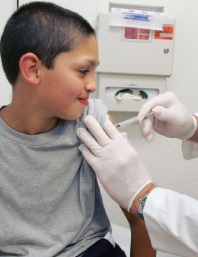Minister warns of skepticism over vaccines
 (CNS): Despite huge health gains in the Caribbean region as a result of successful immunization programmes, outbreaks of certain viral diseases threaten to reverse those gains as a result of growing skepticism about vaccination, in the West the health minister noted at the start of the EPI conference this week being held in the Cayman Islands. Mark Scotland said the UK and the US had both reported a large numbers of measles cases because of a drop in MMR take-up rates. While Cayman still had high take up on vaccination rates he said experts were forced to be ever vigilant in the fight against communicable diseases.
(CNS): Despite huge health gains in the Caribbean region as a result of successful immunization programmes, outbreaks of certain viral diseases threaten to reverse those gains as a result of growing skepticism about vaccination, in the West the health minister noted at the start of the EPI conference this week being held in the Cayman Islands. Mark Scotland said the UK and the US had both reported a large numbers of measles cases because of a drop in MMR take-up rates. While Cayman still had high take up on vaccination rates he said experts were forced to be ever vigilant in the fight against communicable diseases.
“Apart from having to be ever vigilant against new and resurgent viruses, EPI managers are now also faced with a new battle – that of convincing a growing body of skeptical parents that vaccination is an act of love,” Scotland said in his opening address at the 27th Caribbean Expanded Programme on Immunisation (EPI) Managers’ Meeting on Tuesday. “This highlights the need for EPI managers to consistently engage the public, to answer their questions and address their fears.”
He told the delegates while they often work behind the scenes they were some of the most important people in the medical sector. “Medically speaking, this room holds some essential people who are all united by a vital ‘preventative maintenance’ mission,” the minister added.
The conference which is being held at the Marriot this week brings together experts from across the region to discuss the issues relating to vaccine programmes throughout the Caribbean which is celebrating its nineteenth year without an indigenous case of the measles and seven years without an indigenous case of rubella.
In the Cayman Islands, the minister revealed that after sixty years of immunization efforts polio, diphtheria, pertussis, neonatal tetanus, haemophilus influenza type b infections, mumps, measles, rubella, and TB meningitis have been eliminated.
Given that worldwide immunization programmes prevent more than three million deaths annually aside from preventing disease and sparing people the debilitating vaccinations also make sound economic sense, the minister said.
“A cost-benefit analysis in the United States indicated that for every dollar invested in a vaccine dose, authorities save up to US$ 27 in health expenses,” Scotland revealed. Regional studies exhibit the same trend: To treat a case of rotavirus gastroenteritis in Latin American and Caribbean countries costs an average of US$3,000 per patient, while the vaccination costs only US$24 per dose.”
He said that preventing communicable diseases, rather than treating and curing patients, can greatly reduce the strain on a country’s resources.
“If you asked public health professionals to name the top achievements of the past century, the answer would doubtless include immunization. And in the Caribbean specifically, expanded immunization programmes have relegated some of what were once feared diseases to today’s relatively minor maladies,” Scotland added as he revealed that between 90 and 95 percent of all infants are covered and 97 percent of children entering primary school get their vaccinations in the Cayman Islands. .
“Aware of the fact that any successful immunization programme must continually update and adapt, we recently introduced two new vaccines to the childhood vaccination schedule: The latest additions for infants are the rotavirus and pneumococcal vaccines, both of which were introduced in 2009. We also launched a pilot programme for the Human Papillomavirus vaccine, targeting females aged 11-17 years,” the minster said, adding that the next initiative was to add a second dose of the varicella (chickenpox) vaccine to the schedule at school entry and to organize a catch-up programme in January 2011.
Category: Health

